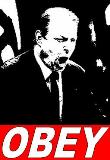Until quite recently, Kingdom of Heaven would have become known as merely the most anti-religious (or more precisely anti-Christian, since criticizing Islam seems to be a lot dicier proposition for "courageous" film-makers) Hollywood blockbuster in a very long time. But in the post-September 11 world, it's primarily Ridley Scott's apparent political message which comes to the fore, and it is quite simple: all Muslims and many Westerners want to lead a peaceful coexistence, but a bigoted, bloodthirsty and rapacious group of Christians spoils it for everyone.
The real history, both that of the twelfth century as well as contemporary one, if of course far more "nuanced". Crusaders certainly had a far share of appalling behavior to their discredit (including the massacre of Jerusalem's residents upon taking the city during the First Crusade, or the rape and pillage of Byzantium on the way to another), but the Saracens were hardly angels either. It was a bitter - albeit very intermittent - conflict fuelled on both sides by religious fervor as well as more earthly desires of land, wealth and glory.
I cannot but the sympathize with Ridley Scott's vision of a society where Christians and Muslims can live with each other in peace and respect, but wishful thinking is not a substitute for history, even in a movie. "Osama bin Laden's version of history" is how one British historian has described the film, and while I wouldn't go as far as calling Kingdom of Heaven a recruiting tool for jihad, a cool and objective look at the Crusades it ain't either, as many other historians have pointed out. Scott's response has been typically modest: "There's been a lot of criticism from historians... But they haven't seen anything. They haven't read anything." |











